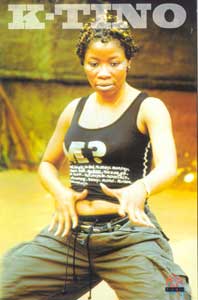Frank Bessem's Musiques d'Afrique
Back to Musiques d'AfriqueRetour aux Musiques d'Afrique
|<< Back to Music of Cameroon
K-Tino
(Cameroon)
Biography
K-Tino is maybe not so well-known outside of Cameroon, but on a national level,
she is famous for her energetic bikutsi music. This music from the central part of the country,
around the capital Yaoundé, gained importance during the late 1980s and 1990s, partly to the detriment
of makossa music, popular throughout the 1970s and 1980s. As the political power basis shifted from the
north to the south, a cultural renaissance of the people living in the south, i.e. the ewondo,
beti and bulu, occurred.
The bikutsi music is characterised by a up-tempo rhythm, danced with rhythmic pulsations of shoulders and/or the pelvis. Since more than two decades now, K-Tino (on earlier albums Catino) is one of the main exponents of bikutsi music. The lyrics of K-Tino are said to be quite explicite, something she rejected during an interview: "dire que ma musique est obscène, c'est dire que la langue ewondo est obscène" (taken from an article on ICCnet Cameroun, 2000). Song titles such as Action 69, Viagra, Ascenseur, Casse Bambou can be interpreted as explicitely as you wish though... At the same time, she is seen by Cameroonian women as a symbol of emancipation and women's empowerment.
Apart from the critical notes, K-Tino is quite popular among part of the population, and she is commonly known as la femme du peuple. In 2014, she claimed to dedicate herself to God, and stopped making the music and lyrics she was known for.
• Musicians on the album « Ascenseur »:
Tino Baroza (Jacques Atini, † 3 April 2019) (guitar),
Beauregard (guitar),
Félix Akono (bass),
B. Robert (keyboards),
Yves Abanda (toumba),
Ange Abanda (backing vocals).
Born: 12 October 1966 in Yaoundé, as Catherine Edoa Ngoa
Style: Bikutsi
The bikutsi music is characterised by a up-tempo rhythm, danced with rhythmic pulsations of shoulders and/or the pelvis. Since more than two decades now, K-Tino (on earlier albums Catino) is one of the main exponents of bikutsi music. The lyrics of K-Tino are said to be quite explicite, something she rejected during an interview: "dire que ma musique est obscène, c'est dire que la langue ewondo est obscène" (taken from an article on ICCnet Cameroun, 2000). Song titles such as Action 69, Viagra, Ascenseur, Casse Bambou can be interpreted as explicitely as you wish though... At the same time, she is seen by Cameroonian women as a symbol of emancipation and women's empowerment.
Apart from the critical notes, K-Tino is quite popular among part of the population, and she is commonly known as la femme du peuple. In 2014, she claimed to dedicate herself to God, and stopped making the music and lyrics she was known for.
• Musicians on the album « Ascenseur »:
Tino Baroza (Jacques Atini, † 3 April 2019) (guitar),
Beauregard (guitar),
Félix Akono (bass),
B. Robert (keyboards),
Yves Abanda (toumba),
Ange Abanda (backing vocals).
Born: 12 October 1966 in Yaoundé, as Catherine Edoa Ngoa
Style: Bikutsi

K-Tino
Discography
| Title | Year | Label | Remarks |
|---|---|---|---|
| Atacho (La danse bancalisť) | 2011 | Ekila Music | |
| 7eme ciel | 2006 | EAP | |
| Best of Vol. 2 | 2005 | Nkulnnam | |
| Best of Vol. 1 | 2003 | Nkulnnam CDNKL 058 | |
| Ne pousse pas... le bouchon loin | 2003 | Nkulnnam CDNKL 055 | & Quartier Poto-Poto |
| Poto-Poto | 2003 | Simon Music S.I.P.E. 29359 | & Quartier Poto-Poto |
| Ekargator | 2001 | Nkulnnam NKL19 | |
| Action 69 | 2001? | Nkulnnam NKL18 | |
| Egalité Oblige | 2000 | Polla Prod. FF 004 | |
| Ekobo | 2000 | Nkulnnam | Cassette |
| Viagra - Baisse-toi | 2000 | JPN Paris | CD |
| La Petite Adada | 1998 | Nkulnnam | |
| Casse Bambou | 1995 | Nkulnnam | |
| Thermomètre | 1993 | Nkulnnam | |
| Ascenseur | 1991 | Chalet Productions Vol.1 | Cassette |
| K-Tino, Rantanplan & Fam Ndzengue: | |||
| Le meilleur du Bikutsi | 2001? | MC Pop Music CD MC 0042 | Compilation |
Sources
Page added August 2001
